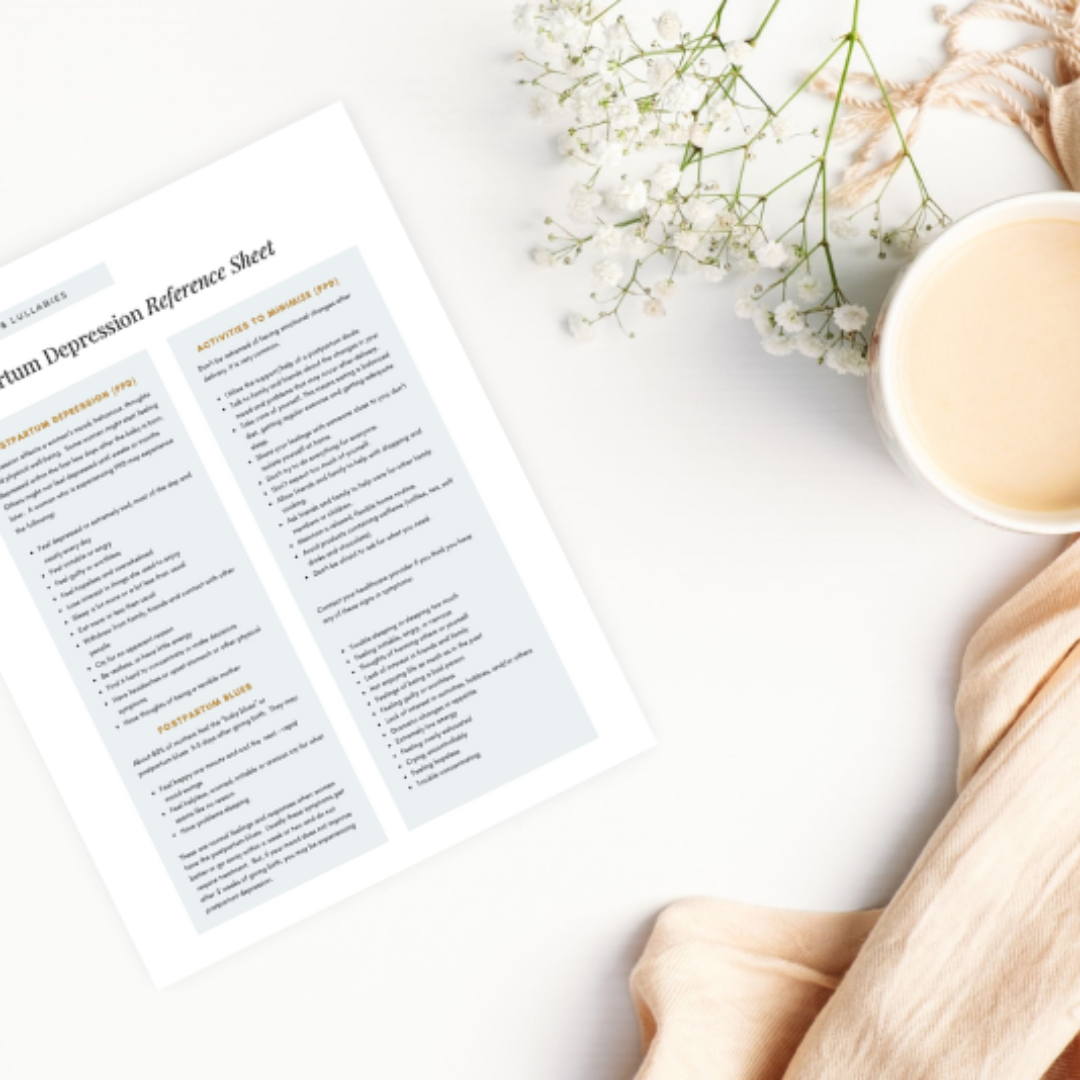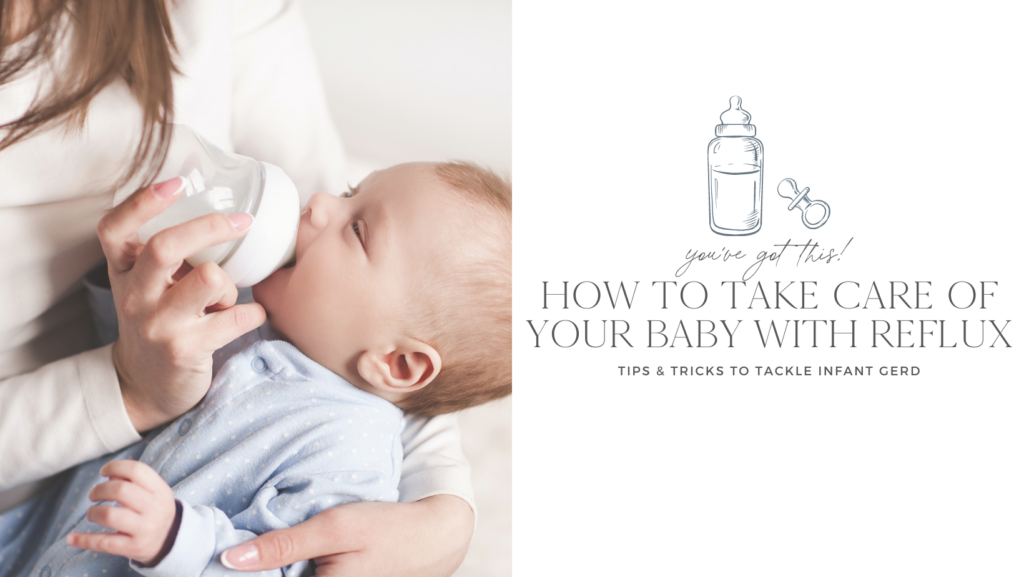
If your baby is struggling with GERD, you may feel like you don’t know where to turn. Don’t worry, you are not alone! This blog post will teach you everything you need to know about baby reflux and how to best care for your child. We’ll discuss how reflux is diagnosed and treated, as well as tips on how to help your baby sleep more comfortably. Keep reading for information that will help both you and your little one get through this difficult time!
{We are a participant in the Amazon Services LLC Associates Program, an affiliate advertising program designed to provide a means for us to earn fees by linking to Amazon.com and affiliated sites. To learn more about affiliate links, click here!}
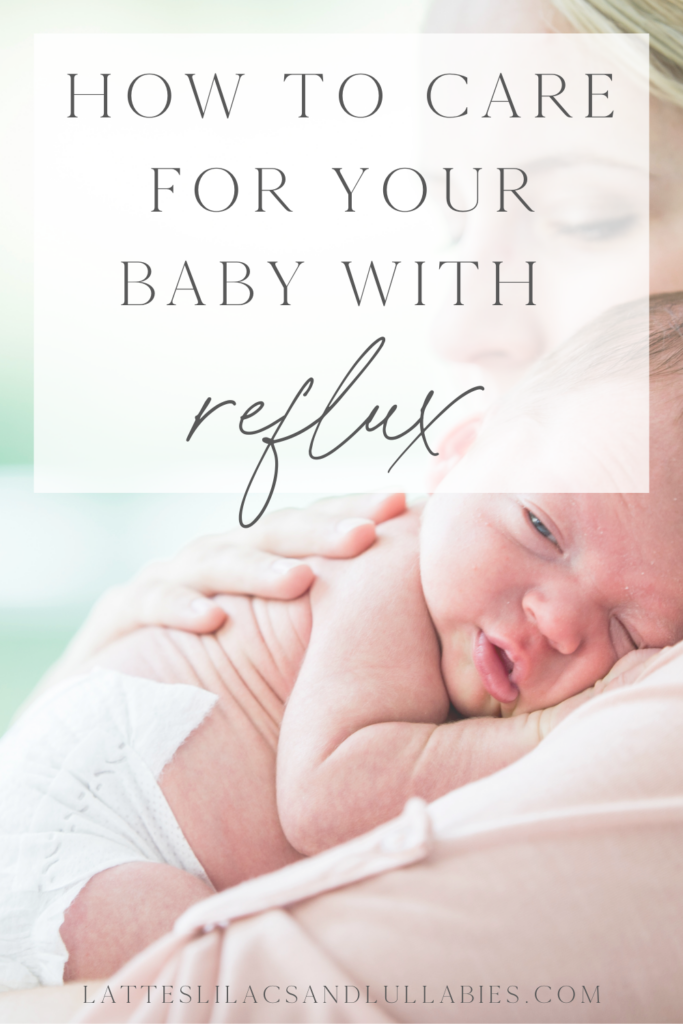
What is Baby Reflux?
First, let’s start with the basics: what is baby reflux? Baby reflux occurs when stomach contents are brought back up into the esophagus. This can happen either on its own or along with vomiting. When it happens frequently, it’s called gastroesophageal reflux disease, or GERD.
GERD can be a really tough condition for babies to deal with. They may cry and seem in pain, arch their backs, or refuse to eat. As parents, it’s heartbreaking to see our little ones going through this. But the good news is that there are ways to help!
How is Baby Reflux Diagnosed?
If you’re concerned that your baby may have GERD, the first step is to talk to your pediatrician. They will likely ask about your baby’s acid reflux symptoms and feeding habits. They may also want to do a physical exam, during which they will listen to your baby’s stomach with a stethoscope.
In some cases, your pediatrician may refer you to a gastroenterologist for additional testing. This may include an upper GI series, in which your baby swallows a liquid that contains barium. This liquid shows up on an X-ray, which can help the doctor see any blockages or abnormalities in the esophagus or stomach.
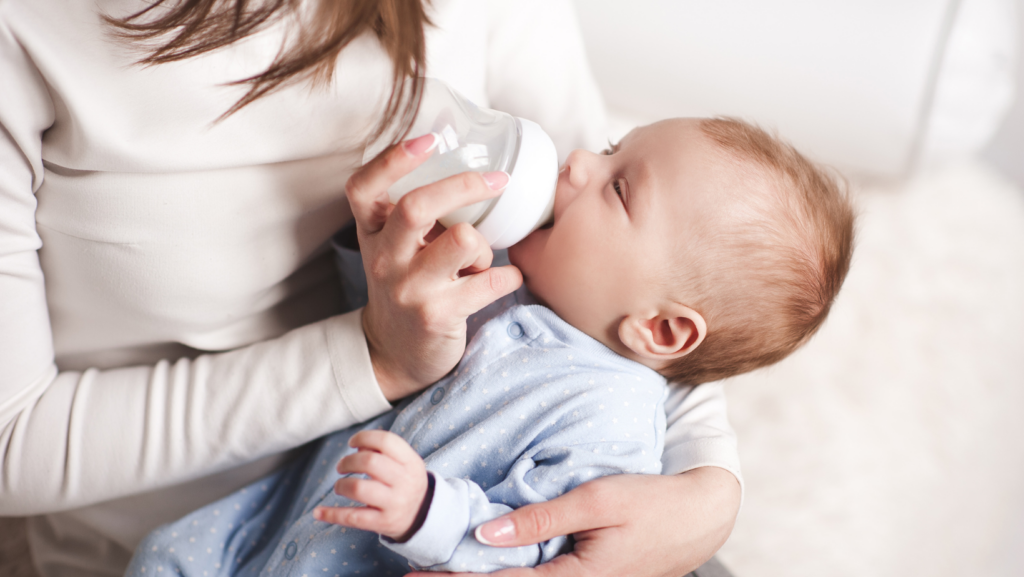
How is Baby Reflux Treated?
Treatment for baby reflux will vary depending on the severity of the condition. In some cases, changes to feeding and sleeping habits may be enough to ease symptoms. For example, your pediatrician may recommend avoiding overfeeding, keeping your baby upright during feedings, and burping often. They may also suggest thickening your baby’s formula or breast milk with rice cereal. If these lifestyle changes don’t seem to be enough, your doctor may prescribe medication. The most common type of medication used for GERD is a proton pump inhibitor (PPI). PPIs work by decreasing the amount of acid produced in the stomach. This can help to reduce symptoms and allow your baby to sleep and eat more comfortably.
How Do I Know If My Baby Has Reflux?
Gastroesophageal Reflux Disease, or GERD, is a digestive disorder that affects the lower esophageal sphincter, the ring of muscle between the esophagus and stomach. Babies with GERD often spit up more than usual, burp frequently, have difficulty sleeping, and may even suffer from wheezing or trouble breathing.
While some babies outgrow GERD as they get older, others will need medical treatment to control their symptoms. If you’re concerned that your baby may have GERD, talk to your pediatrician. They can help you determine if your child’s symptoms are due to reflux or another condition, and they can offer suggestions for relieved.
Remember, not all babies who spit up have GERD, but it’s always best to err on the side of caution when it comes to your little one’s health.

Infant Reflux vs. GERD
If you thought baby’s first year would be a breeze, you might be in for a rude awakening. Around 30-50% of infants experience baby reflux, otherwise known as Gastroesophageal Reflux Disease (GERD). Though baby reflux is most common during the first few months, it can continue until baby is a year old – or even longer.
The good news is that, in most cases, baby reflux is harmless and doesn’t require treatment. The bad news is that it can be extremely painful and uncomfortable for baby – and very stressful for parents.
So what are the symptoms of baby reflux? Poor weight gain, spitting up large amounts of milk, vomiting, arching the back during or after feedings, discomfort when lying down, irritability and crying are all signs that your baby may be experiencing reflux.
If your baby is showing any of these symptoms, talk to your pediatrician. They may recommend making some lifestyle changes – such as feedings smaller amounts more frequently – or prescribe medication to help reduce stomach acid. In severe cases, surgery may be necessary.
But don’t worry – no matter what type of baby reflux your child has, there are treatments available to help ease their discomfort.

Spit Up Vs. Reflux
Most babies spit up. It’s just a fact of life. They eat, they burp, they spit up. Some do it more than others, but all babies do it to some degree. And that’s totally normal and nothing to worry about.
Spit up usually happens right after a feeding or during burping, when the baby’s tummy is full and the muscle between the stomach and esophagus is relaxed. When the muscle isn’t tight enough, food and stomach acid can backflow, or “reflux,” into the esophagus. This can cause your baby to spit up more than usual or even vomit.
Reflux is different from spit-up because it includes other symptoms like fussiness, crying, irritability, and trouble sleeping after eating. If your baby is happy and spitting up only occasionally, there’s no need to worry. But if your baby seems uncomfortable or unhappy after feedings, it could be a sign of reflux.
Talk to your pediatrician about your baby’s reflux symptoms, especially if it seems like your baby is experiencing pain. He or she can help you figure out whether it’s normal and something that will ease as baby grows or if it’s something more serious that needs to be treated.
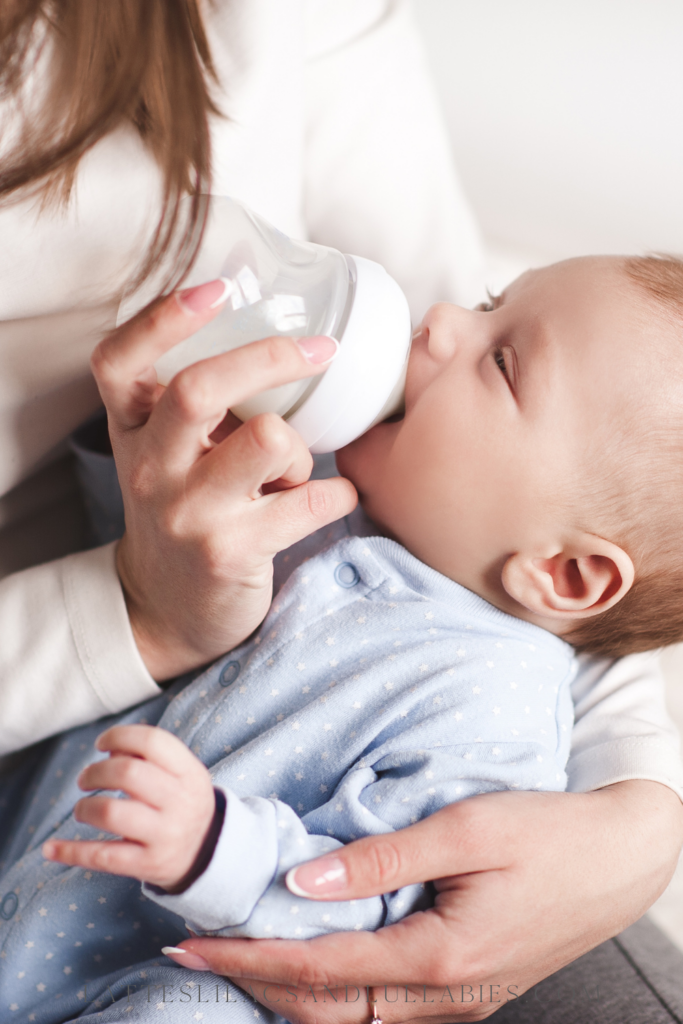
What To Do If Baby Has Reflux
If your baby does have reflux, there are things you can do to help ease their discomfort and make them more comfortable.
First, try small, frequent feedings instead of large ones. This will help to avoid overfilling their stomach, which can lead to vomiting. You might also want to keep them upright for at least 30 minutes after feedings, to give the food time to digest.
There are also several types of medication that can help reduce stomach acid and ease symptoms of reflux. These include antacids, H-blockers, and proton pump inhibitors (PPIs). Your pediatrician will be able to tell you if medication is necessary and which type would be best for your baby.
Finally, make sure your baby is sleeping on their back. This will help to prevent the contents of their stomach from coming back up into their esophagus.
How To Help A Baby With GERD Sleep Better
If your baby has GERD, you might be wondering how to get them to sleep through the night. After all, sleep is crucial for both baby and parents!
There are a few things you can do to help your little one (and yourself) get some much-needed rest. First, hold baby upright after feedings for at least 20-30 minutes. This will help to keep stomach acid from coming back up into the esophagus.
You might also want to try giving them a small bedtime snack of formula or breastmilk. This can help to soothe their stomach and reduce the risk of reflux during the night. Just be sure not to give them too much, as this can lead to vomiting.
Finally, make sure they are sleeping on their back. This position will help to prevent the contents of their stomach from coming back up into the esophagus.
With some trial and error, you should be able to find a sleep routine that works for both you and your baby. And soon enough, everyone will be getting the rest they need!

FAQ’s About Caring For A Baby With Reflux
Q- Are reflux wedges safe for babies?
A- No, using a baby reflux wedge is not recommended for safe sleep and prevention of SIDS. Sleeping on his/her back is still the safest sleep position even for reflux babies. Speak with your pediatrician regarding other ways to treat reflux.
Q- How often should I feed my baby?
A- It’s generally recommended that you feed your baby small, frequent meals rather than large ones. This will help to avoid overfilling their stomach, which can lead to vomiting.
Q- What is the best position for a baby with reflux?
A- The best position for a reflux babies is on their back. This position will help to prevent the contents of their stomach from coming back up into the esophagus.
Q- Should babies with reflux sleep on an incline?
A- No, babies with reflux should not sleep on an incline.
Q- What to do when baby is choking on saliva while sleeping?
A- If your baby is choking on saliva while sleeping, you may want to monitor them closely and speak with your pediatrician. Moving baby onto his side and burping him should help with the choking, but baby’s doctor may have other suggestions.
Q- Is gripe water safe for babies with reflux?
A- Gripe water is generally safe for babies with reflux. However, you should talk to your doctor before giving it to your baby, as some gripe waters contain alcohol or gluten.
Q- What are the long-term effects of reflux in babies?
A- The long-term effects of reflux in babies are generally not serious. However, if left untreated, GERD can lead to more serious problems such as esophagitis or Barrett’s esophagus.
Q- Can reflux cause SIDS?
A- There is no evidence that reflux causes SIDS. However, if your baby has GERD, it’s important to treat it, as untreated GERD can lead to more serious problems.
Q- Does the SNOO help with reflux?
A- The SNOO is a bassinet that helps to reduce the risk of SIDS. It does not specifically help with reflux, but by keeping your baby in a safe sleep position, it may help to reduce the risk of GERD.
Q- How can I tell if my baby has silent reflux?
A- Silent reflux is often diagnosed based on symptoms, such as irritability, difficulty feeding, and foul smelling breath. Your doctor may also recommend a pH monitor to confirm the diagnosis.
Q- Is acid reflux worse at night for babies?
A- Acid reflux can be worse at night for babies. This is because lying down makes it easier for stomach acid to come back up into the esophagus.
Q- What is the best formula for a baby with reflux?
A- The best formula for a baby with reflux is one that is easy to digest and low in allergens. You should talk to your doctor about which formula is best for your baby.
Q- Can probiotics help a baby with reflux?
A- Probiotics may help to reduce the symptoms of GERD in babies. However, you should talk to your doctor before giving your baby probiotics, as some types may not be suitable for infants.
Q- What to do if baby is choking in sleep?
A- If your baby is choking in their sleep, you should talk to your doctor. They may recommend elevating the head of the crib or bassinet, or changing your baby’s sleep position.
Q- Is it safe to elevate crib mattress?
A- Yes, it is safe to elevate the crib mattress. This will help to keep the contents of the stomach from coming back up into the esophagus.
Q- How long does baby reflux last?
A- Baby reflux usually goes away on its own by 12 months old. However, some babies may have GERD, which is a more serious form of reflux that requires treatment.
Q- Is it normal for baby to spit up after every feeding?
A- It is common for babies to spit up after every feeding. However, if your baby is spitting up more than usual, or if they are having difficulty gaining weight, you should talk to your doctor.
You are not alone in this! With the right information and support, you can help your baby get through reflux and on to a happy, healthy life!
More Posts You’ll Love…
- How To Swaddle A New Baby
- Ultimate Guide to Baby Essentials
- Best Gifts for Baby’s First Christmas
- 8 Special Ways To Celebrate Baby’s 1st Thanksgiving
- 50+ Tips for New Moms To Help You Survive The 1st Year
- Best Baby Gear of 2020
Stephanie Wilson




